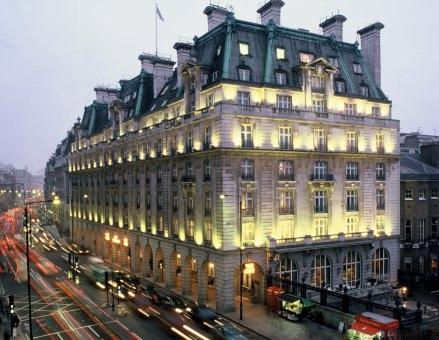You might say that the grand hotels brought this on themselves. Time Shift: Hotel DeLuxe on BBC Four last night saw beneath the shine of their marble atria and heard the uncomfortable murmurs under the joyful gossip of their chic bars. What started out as an apparent paean to the luxury hotel - the Savoy, the Ritz, the Dorchester - with an emphasis on the glamour, energy, buzz and innovation they created soon turned into a documentary with a social conscience.
The fruity, naughty narration of Fenella Fielding, the jazzy soundtrack ("Puttin' on the Ritz"), hyperbolic statements proclaiming luxury hotels "the ultimate urban symbol of wealth and power", the emphasis on the illicit activities which took place there - I frankly dreaded the rest of the hour. Who needs to be told how wonderful these hotels are? We have tourist boards and PR and BBC Three for that.
Instead, the magnificence of the hotels was always considered against the social background. Luxury hotels started to boom when railways did - when the British Empire flourished and the wealthy classes could travel more easily to towns more worth visiting. Why stay at a dilapidated country house when the Savoy offered lifts, telephones or (gasp!) en suite bathrooms? The luxury hotel always seemed a few steps ahead, more flexible despite their size, and intriguing because of it.
The first century passed by rather quickly while Britain reached its height; like with so many areas, it took World War Two to shake the foundations. The emphasis on class difference sparked by the imperial decline of Britain was highlighted by the BBC's 1963 upstairs/downstairs documentary, with poorly paid chambermaids dusting rooms which cost more than their monthly wage. Contrarily, Soviet hotels recognised the contribution of the workers, although workers were of course banned.
And so on: the unrestrained banal hotel-building boom of the Sixties, the jet-set's reaction (to jet-set off to Jamaica), the naughty, chic boutique hotels of the Seventies, the foreign takeovers of English hotels which continue today. Given the wealth disparities which exist in global society, it is no surprise that once more hotels are taking off into the stratosphere, with seven stars and unique rooms and service so servile you'd think you're Nero.
One of the talking heads got it dead on: "However society may change, there will always be people willing to buy what [the hotels] are selling." This programme provided a valuable reminder of mutability: as the economy and our ideas of luxury have changed, so have luxury hotels - but we are always willing to be seduced by whatever the myth of the moment is.
- Watch Time Shift on the BBC iPlayer
 Find London travel guides on Amazon
Find London travel guides on Amazon















Add comment